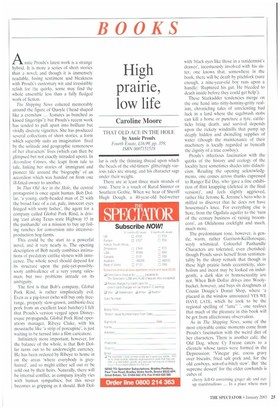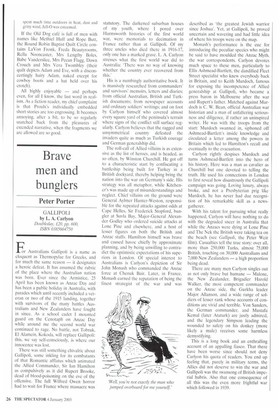High prairie, low life
Caroline Moore
THAT OLD ACE IN THE HOLE by Annie Proulx Fourth Estate, £16.99, pp. 359, ISBN 0007151519 Annie Proulx's latest work is a strange hybrid. It is more a series of short stories than a novel; and though it is immensely readable, fusing sentiment and bleakness with Proulx's customary wit and irresistible relish for the quirky, some may find the whole ensemble less than a fully fledged work of fiction.
The Shipping News cohered memorably around the figure of Quoyle ('head shaped like a crenshaw ... features as bunched as kissed fingertips'); but Proulx's recent work has tended to pull apart into brilliant but vividly discrete vignettes. She has produced several collections of short stories, a form which superbly suits an imagination fired by the solitude and geographic remoteness of her characters' lives (which can then be glimpsed but not exactly intruded upon). In Accordion Crimes, she leapt from tale to tale, linking her stories of immigrant and pioneer life around the 'biography' of an accordion which was handed on from one ill-fated owner to another.
In That Old Ace in the Hole, the central protagonist is once again human. Bob Dollar, 'a young, curly-headed man of 25 with the broad face of a cat, pale, innocent eyes fringed with sooty lashes', the agent for a company called Global Pork Rind, is driving 'east along Texas state Highway 15 in the panhandle' on a mission to buy up failing ranches for conversion into intensiveproduction hog-farms.
This could be the start to a powerful novel, and it very nearly is. The opening description of Bob neatly combines intimations of predatory catlike slyness with innocence. The whole novel should depend for its structure upon the pale-yet-possiblysooty ambivalence of a very young salesman; but two problems intrude on its ambiguity.
The first is that Bob's company, Global Pork Rind, is rather simplistically evil. Even as a pig-lover (who will buy only freerange, properly slow-grown, antibiotic-free pork from an excellent local butcher) I felt that Proulx's version verged upon Disneyesque propaganda. Global Pork Rind operations manager, Ribeye Cluke, with his moustache like 'a strip of porcupine', is just waiting to be turned into a film caricature.
Infinintely more important, however, for the balance of the whole, is that Bob Dollar turns out to be underweight currency. He has been ordered by Ribeye to home in on the areas 'where everybody is greyhaired', and so might either sell out or be sold out by their heirs. Naturally, there will be internal conflict, as company loyalty vies with human sympathies; but this never becomes as gripping as it should. Bob Dol lar is only the thinning thread upon which the beads of the old-timers' glitteringly various tales are strung; and his character sags under their weight.
There are at least three main strands of tone. There is a touch of Rural Sinister or Southern Gothic. When we hear of Sheriff Hugh Dough, a 40-year-old bed-wetter with 'black eyes like those in a taxidermist's drawer', incestuously involved with his sister, one knows that, somewhere in the book, there will be death by pitchfork (sure enough, a nine-year-old boy runs upon a handle: 'Ruptured his gut. He bleeded to death inside before they could get help').
These Starkadder tendencies merge on the one hand into nitty-hominy-gritty realism, chronicling tales of unrelenting bad luck in a land where the sagebrush stobs can kill a horse or puncture a tyre, cattleticks bring death, and survival depends upon the rickety windmills that pump up deeply hidden and dwindling supplies of water (though the maintenance of their machinery is locally regarded as beneath the dignity of a true cowboy).
Proulx's infectious fascination with the quirks of the history and ecology of the locality here sometimes shades into didacticism. Reading the opening acknowledgments, one comes across thanks expressed to Ranger Ed Day, who 'gave a fine exhibition of flint knapping (deleted in the final version)', and feels slightly aggrieved, rather like Jerome K. Jerome's hero who is miffed to discover that he does not have housemaid's knee. For everything else is here, from the Ogallala aquifer to the 'turn of the century business of raising broomcorn', an Oklahoma cockfight and much, much more.
The predominant tone, however, is gentle, warm. rather Garrison-Keilloresque, wryly whimsical. Colourful Panhandle Characters are tolerated, even cherished: though Proulx saves herself from sentimentality by the sharp remark that though in these high prairie lands eccentricity, alcoholism and incest may be looked on indulgently, a dark skin or homosexuality are not. When Bob Dollar drives into Woolybucket, however, and buys six doughnuts at Cousin Dougie's Donut Shop, where 'a placard in the window announced YES WE HAVE LATE, which he took to be the regional spelling of "latte" ', one realises that much of the pleasure in this book will be got from affectionate observation.
As in The Shipping News, some of the most enjoyable comic moments come from Proulx's fascination with the weird diet of her characters. There is another café, the Old Dog, where Cy Frease caters to a clientele whose tastes were formed in the Depresssion: 'Vinegar pie, cocoa gravy over biscuits, fried salt pork and, for the old cowboys, son-of-a-bitch stew'. But 'the supreme dessert' for the older cowhands is cubes of
cherry Jell-O containing ginger ale and cutup marshmallows ... In a place where men spent much time outdoors in heat, dust and gritty wind. Jell-O was esteemed.
If the Old Dog café is full of men with names like Methiel Huff and Rope Butt, the Round Robin Baptist Quilt Circle contains LaVon Fronk, Freda Beautyrooms, ReIla Nooncaster, Mrs Lengthy Boles, Babe Vanderslice, Mrs Pecan Flagg, Dawn Crouch and Mrs Vera Twombley (their quilt depicts Adam and Eve, with a disconcertingly hairy Adam, naked except for cowboy boots and a hat held over his crotch).
All highly enjoyable — and perhaps even, for all I know, the last word in realism. As a fiction reader, my chief complaint is that Proulx's individually embedded short stories are too engrossing. It becomes annoying, after a bit, to be so regularly snatched back from the pleasures of extended narrative, when the fragments we are allowed are so good.



















































 Previous page
Previous page